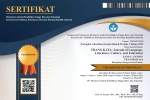A Qualitative Linguistic Analysis of Hiligaynon Codeswitching Structure in Kidapawan City
DOI:
https://doi.org/10.54923/jllce.v6i1.161Keywords:
Codeswitching structure, linguistic analysis, Hiligaynon, PhilippinesAbstract
Ilonggo people in Kidapawan City, Philippines, code-switch for various social and practical reasons. However alive the Hiligaynon language is, there has not available a study on its codeswitching and its predominant structure. This qualitative research study employing linguistic analysis determined how codeswitching is structured and what dominant type of codeswitching is used in Hiligaynon language in Kidapawan City. The participants were Ilonggo individuals who are at least 18 years old and residing in Kidapawan City, Philippines. They were selected using Fishman’s (1972) five language domains of language use, which include school, home, church, market, and neighborhood. This study employed overt observation conducted in multiple sessions, with participants observed individually in their natural settings. The interactions ranged from formal to informal, depending on the context in which the observation took place. The study analyzed 50 instances of codeswitching, which were analyzed based on McArthur's (1998) codeswitching theory. The study found four structures of codeswitching in Hiligaynon: inter-sentential switching, where languages switch between sentences; intra-sentential switching, where languages mix within a sentence; intra-word switching, which happens within a single word; and tag switching, where a tag or interjection from one language is added to a sentence in another language. Results also revealed that Hiligaynon speakers predominantly use intra-sentential switching. Findings imply that Hiligaynon speakers are highly proficient in both their native and second languages, allowing them to switch between languages to adapt their speech for social acceptance and find precise words to facilitate conversations more effectively across multilingual contexts.
Downloads
Downloads
Published
How to Cite
Issue
Section
License
Copyright (c) 2025 Rowena Sosas, Marialou Quinding

This work is licensed under a Creative Commons Attribution-ShareAlike 4.0 International License.





